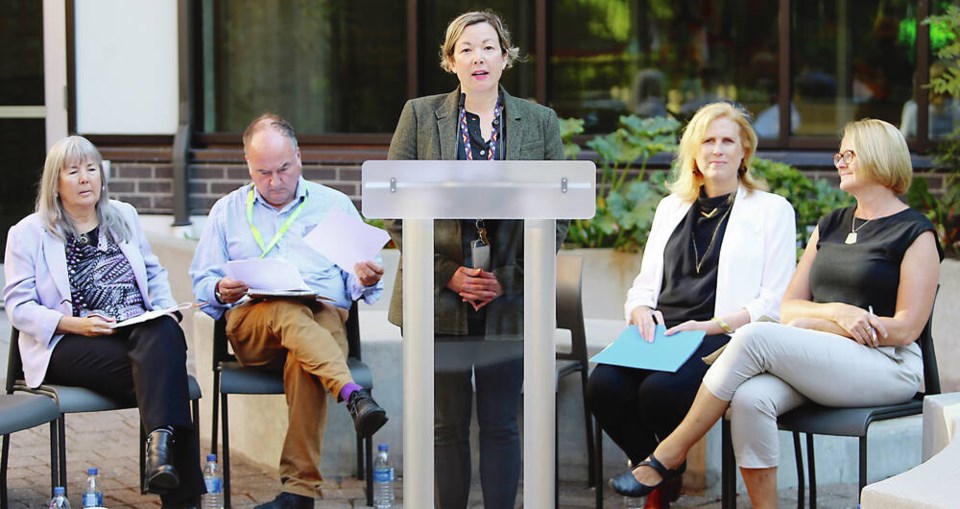A $500-million fund to help non-profit-housing providers buy buildings to preserve affordable rentals was well received by housing advocates in Greater Victoria Thursday.
“This is significant,” said Carolina Ibarra, executive director of Pacifica Housing. “It’s not the be-all end-all solution to the problem, but it is a significant step in preventing the loss of affordable housing and it’s a critical piece of the bigger puzzle for having a sound housing strategy.”
B.C. Premier David Eby announced the Rental Protection Fund in Burnaby Thursday with Housing Minister Ravi Kahlon. It’s expected to be operational within months and financed before March 31 as part of a near $6-billion surplus from this year.
The fund, a key part of Eby’s leadership campaign platform, will provide one-time capital grants to non-profit-housing organizations so they can purchase affordable residential rental buildings and co-operatives that are listed for sale and slated for development.
“This fund will allow non-profits to secure older rental buildings and protect vulnerable renters from speculators who can drive up rents and evict tenants who have lived there for years,” said Eby. “We expect the fund to protect renters in thousands of affordable units.”
There were 669,450 rental households in B.C. in 2021, according to Census figures — about one-third of all B.C. households.
The premier criticized the “predatory model” used by international corporations to buy rental buildings as investments, which leads to evictions and rent hikes that can lead to homelessness, with the result that families, seniors and vulnerable people struggle to stay in their own communities.
“There is no feeling worse than waking up in the morning and seeing a for sale sign on the front lawn of the building that you live in,” said Eby, “because it opens up a whole question about whether you’re going to be able to stay in your home.”
Across Canada, rental buildings are often purchased by speculators and large corporations, real-estate investment trusts, called REITs for instance, and redeveloped so as to evict existing tenants and allow the trusts to hike the rents or sell the units.
According to Canada Mortgage and Housing Corporation data, between 1991 and 2021, approximately 97,000 purpose-built rental units in B.C. were either redeveloped or converted to more expensive units.
The province says the fund will be managed by an external entity, the Housing Protection Fund Society, consisting of the B.C. Non-Profit Housing Association, Co-operative Housing Federation B.C., and the Aboriginal Housing Management Association.
Pacifica Housing head Ibarra, whose organization is part of the B.C. Non-Profit Housing Association, said only large investment firms typically have the financial capacity to acquire rental buildings, often turning them into luxury condos.
The province says the new fund will help non-profit organizations obtain private financing so income generated by current rents will offset costs, minimizing the financial involvement of the province.
Ibarra said she hadn’t been briefed Thursday on how the funding would be allotted, but says the sector doesn’t currently have the down payments and financing to acquire buildings as they come up for sale.
During the pandemic, funding was made available through the province, but Pacifica Housing and others “ended up competing with the provincial government and others,” she said.
A fund just for non-profits “really does give us that opportunity to bring in those rental buildings into the community housing sector, so that long term they are protected as community assets,” said Ibarra.
Thom Armstrong, CEO of the Co-operative Housing Federation B.C., called the fund a “groundbreaking move by the province,” expressing hope that other jurisdictions will follow suit.
Beyond the housing fund, however, Ibarra says other hurdles remain to be addressed.
Ibarra would like to see a mechanism, possibly through the federal government, to give preferential interest rates to non-profits, property-tax exemptions through municipal governments, and grants and subsidies targeted to the construction and development of new units.
Sylvia Ceacero, executive director of the Greater Victoria Coalition to End Homelessness, said current levels of homelessness and housing instability are unprecedented.
“It is something that we can address and fix together,” said Ceacero. “I applaud this government for trying to put some solutions in place that are about creating that stability that we seem to be losing.”



